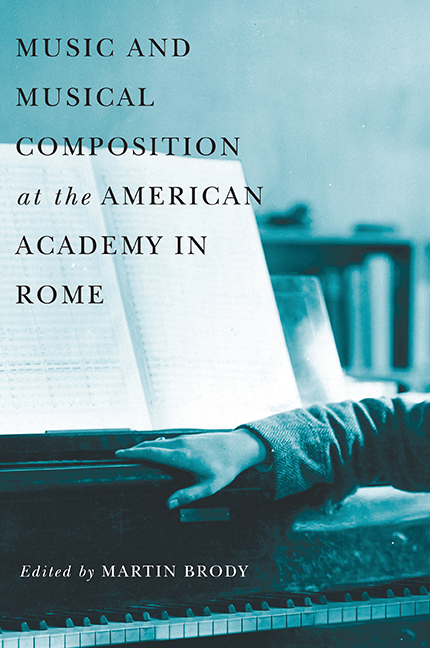Book contents
- Frontmatter
- Contents
- List of Illustrations
- Introduction
- Part One A History of the Rome Prize
- Part Two Origins, Ideology, Patronage
- Part Three Two Case Studies in Internationalism
- 5 Forging an International Alliance: Leo Sowerby, Elizabeth Sprague Coolidge, and the Impact of a Rome Prize
- 6 Class of ’54: Friendship and Ideology at the American Academy in Rome
- Part Four Primary Sources
- Appendix: Composers at the American Academy in Rome, 1921–40
- Selected Bibliography
- List of Contributors
- Index
6 - Class of ’54: Friendship and Ideology at the American Academy in Rome
from Part Three - Two Case Studies in Internationalism
Published online by Cambridge University Press: 25 October 2017
- Frontmatter
- Contents
- List of Illustrations
- Introduction
- Part One A History of the Rome Prize
- Part Two Origins, Ideology, Patronage
- Part Three Two Case Studies in Internationalism
- 5 Forging an International Alliance: Leo Sowerby, Elizabeth Sprague Coolidge, and the Impact of a Rome Prize
- 6 Class of ’54: Friendship and Ideology at the American Academy in Rome
- Part Four Primary Sources
- Appendix: Composers at the American Academy in Rome, 1921–40
- Selected Bibliography
- List of Contributors
- Index
Summary
Introduction: To Meet This Urgent Need
The story of music composition at the American Academy in Rome might be told as a series of Bildungsromane with each Rome Prize winner taking a turn as protagonist. This, in effect, was the method prescribed by the elders. The narrative was already intact when William Rutherford Mead, second president of the Academy, announced the new prize for composers. His statement was covered by the New York Times on July 9, 1921, two weeks to the day after the Times had reported on the opening ceremonies of a new “French-American” music school at Fontainebleau. Mead drew a sharp distinction: “The American Academy in Rome was not established to give instruction to budding artists,” he declared. Rather, like its august French counterpart at the Villa Medici, the American Prize of Rome would promote a more ineffable exchange. “It was established,” Mead elaborated, “in order that picked young men who had proved in competition here their capacity for their professions might gain in Rome the refinement and inspiration fl owing from the monuments of the past.” In the development of mature, American composers, pedagogy and professionalism would go only so far. Budding talent would have to be plucked early and replanted in enriched soil, to gestate aesthetically and spiritually in the undying light and heat of the ancient world's ever-radiant monuments.
Mead's statement echoed a fervent appeal from a Harvard music professor, Walter Spalding, whose comments had appeared a year earlier, in the Academy's twenty-fifth anniversary book. Despite his illustrious career as a teacher, Spalding focused on the insufficiencies of American compositional pedagogy as he argued for the merits of the Roman sojourn. “Our Democracy has taken up music more vigorously and sympathetically than any of the other Fine Arts,” he declared. “But although there are many schools and academies which turn out performers of the first rank, they never have, and in the very nature of things they cannot produce composers.” By excluding composers from a transitive scheme of cultural production (a democratic society, a flourishing musical education system, a proliferation of “performers of the first rank”), Spalding gave voice to an unsettling anxiety: that the unruly democratic vistas and mores of the United States might be fundamentally incompatible with the nourishment of refined musical creators.
- Type
- Chapter
- Information
- Music and Musical Composition at the American Academy in Rome , pp. 222 - 254Publisher: Boydell & BrewerPrint publication year: 2014



